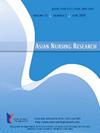Effectiveness of the Individualized Self-Care Program Based on Orem's Self-Care Theory: Impact on Learning Needs and Self-Care Behaviors Following Coronary Artery Bypass Surgery – A Randomized Controlled Trial
IF 2.3
3区 医学
Q2 NURSING
引用次数: 0
Abstract
Purpose
This study aimed to investigate the specific learning needs of patients within the experimental group after receiving the Individualized Self-Care Program (ISCP) at two key time points: Time 2 (Day 2, Week 1) and Time 3 (Day 15, Week 3). Furthermore, it aimed to compare the effectiveness of the ISCP in improving self-care behavior between the experimental group and the control group, which received standard health education.
Methods
The study utilized a randomized controlled trial (RCT) design and included a consecutive sample of 128 patients who had undergone their first Coronary Artery Bypass Graft (CABG) procedure. These patients were randomly divided into two groups: the experimental group (n = 64) and the control group (n = 64). The experimental group received an ISCP at Time 2 and Time 3 after being discharged, whereas the control group received standard health education. Statistical analyses included paired t-tests to assess differences in learning needs over time and Repeated Measures Analysis of Variance (ANOVA) to evaluate the effectiveness of the ISCP on self-care behavior.
Results
A paired t-test indicated a statistically significant difference in the total number of learning needs identified within the experimental group between Time 2 and Time 3 assessments. Patients in the experimental group initially identified more learning needs at Time 2 (4.3 ± 1.5), but their knowledge significantly improved at Time 3, leading to fewer learning needs (2.6 ± 1.1). Furthermore, an ANOVA comparing the experimental and control groups showed that the ISCP effectively improved self-care behavior in the experimental group, with significantly greater improvements compared to the control group, which received standard health education.
Conclusion
ISCP delivered in early recovery enhances self-care behaviors and addresses postdischarge gaps. The study also revealed that patients' learning needs change over time during home recovery, emphasizing the importance of tailored self-care programs for CABG patients after discharge.
Trial registration
IRCT registration number: ISRCTN96836216.
基于 Orem 自我护理理论的个性化自我护理计划的效果:对冠状动脉搭桥术后学习需求和自我护理行为的影响 - 随机对照试验。
目的:本研究旨在调查实验组患者在接受个体化自我护理计划(ISCP)后,在两个关键时间点的具体学习需求:时间 2(第 2 天,第 1 周)和时间 3(第 15 天,第 3 周)。此外,研究还旨在比较实验组与接受标准健康教育的对照组在改善自我保健行为方面的效果:研究采用随机对照试验(RCT)设计,连续抽取了 128 名首次接受心血管造影术的患者。这些患者被随机分为两组:实验组(64 人)和对照组(64 人)。实验组在出院后的第 2 和第 3 个时间点接受 ISCP,而对照组则接受标准的健康教育。统计分析包括配对 t 检验和重复测量方差分析(ANOVA),配对 t 检验用于评估不同时间段学习需求的差异,重复测量方差分析用于评估 ISCP 对自我护理行为的影响:结果:配对 t 检验表明,在时间 2 和时间 3 评估之间,实验组确定的学习需求总数存在显著统计学差异。实验组患者最初在时间 2 发现了更多的学习需求(4.3±1.5),但在时间 3,他们的知识显著提高,导致学习需求减少(2.6±1.1)。此外,对实验组和对照组进行的方差分析显示,ISCP 有效改善了实验组的自我保健行为,与接受标准健康教育的对照组相比,实验组的自我保健行为改善幅度更大:结论:在康复早期开展 ISCP 可增强自我护理行为,弥补出院后的不足。研究还显示,患者的学习需求在家庭康复期间会随着时间的推移而发生变化,这强调了为 CABG 患者量身定制出院后自我护理计划的重要性。
本文章由计算机程序翻译,如有差异,请以英文原文为准。
求助全文
约1分钟内获得全文
求助全文
来源期刊

Asian Nursing Research
NURSING-
CiteScore
4.20
自引率
4.50%
发文量
32
审稿时长
45 days
期刊介绍:
Asian Nursing Research is the official peer-reviewed research journal of the Korean Society of Nursing Science, and is devoted to publication of a wide range of research that will contribute to the body of nursing science and inform the practice of nursing, nursing education, administration, and history, on health issues relevant to nursing, and on the testing of research findings in practice.
 求助内容:
求助内容: 应助结果提醒方式:
应助结果提醒方式:


